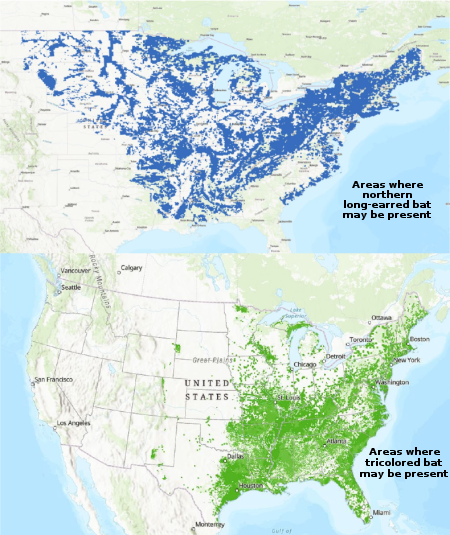Fish & Wildlife has expanded its regulatory rule to every tree in much of the U.S.

The blue and green areas are now subject to
Fish & Wildlife regulation if you intend to cut
down any trees
Apparently in a bid to give itself more power over every proposed building project in the United States, the Fish & Wildlife Service in October 2024 (just before the election) wildly expanded its regulatory rules for protecting endangered bats.
According to the new rules, Fish & Wildlife now considers the removal of any trees at such projects to be a risk to the endangered species, because those trees “may” have been used as roosts and would therefore threaten the species ability to survive if removed.
No matter that there may be thousands of other trees nearby, including many acres of forest. If you are building anything that involves cutting down any trees, you will be subjected to Fish & Wildlife supervision that could block construction. And the area this new rule covers includes almost the entire eastern and northern parts of the United States, as shown on the maps to the right, taken from the new regulation guidelines [pdf].
Long time reader Jack O’Leary informed me of this new power grab. He also sent me information about one particular project in Massachusetts involving the installation of a well and pump station in a forested area southeast of Boston, far from any bat hibernacula. The only impact this project might have on any bats is the removal of some trees, though the project is located in a forested area with hundreds of acres of trees all around (as shown clearly on the satellite view on Google maps).
Yet Fish & Wildlife makes it clear in its letter [pdf] to the project that its “Endangered Species Act requirements are not complete.” Fish & Wildlife admits that the project will pose no direct threat to the endangered bats, but the very act of cutting down a few trees “may affect” the bats, so therefore government regulatory supervision is required.
The government paperwork repeatedly says its requirements from private owners is “voluntary”, but it also makes it clear if you don’t “volunteer” the government might come down on you like a ton of bricks.

“Nice project you got here. Shame
if something happened to it.”
Essentially what Fish & Wildlife is saying is simple: “That’s a nice project you got there. Sure would be a shame if something happened to it. Maybe you should do what we say to protect it from harm!”
This new regulatory framework is part of an overall pattern in the past decade by the federal government’s various environmental agencies to expand their power and control. Once environmental impact statements were only required once, at the start of any project, and only in certain situations where the project carried clear environmental risks. Now impact statements and reassessments are required for all work, no matter where or when, and are required again and again if projects are revised or changed slightly.
The space community has seen this power grab play out most starkly at the long established spaceports in Florida and Vandenberg, and at SpaceX’s new launch facility at Boca Chica. Even though we have empirical evidence over almost three-quarters of a century that rocket launches not only do no significant harm to the environment, they help wildlife thrive by creating large areas where development cannot occur. Yet, in the past decade the ability for new companies to launch at these facilities has been seriously hampered and delayed because of endless demands for new impact statements.
This new Fish & Wildlife rule will impact almost every construction project in the eastern half of the United States, as it apparently requires government review and approval (not guaranteed) for any work that removes or trims even one tree.
This is definitely an area that needs a quick review by the Trump administration.
On Christmas Eve 1968 three Americans became the first humans to visit another world. What they did to celebrate was unexpected and profound, and will be remembered throughout all human history. Genesis: the Story of Apollo 8, Robert Zimmerman's classic history of humanity's first journey to another world, tells that story, and it is now available as both an ebook and an audiobook, both with a foreword by Valerie Anders and a new introduction by Robert Zimmerman.
The print edition can be purchased at Amazon or from any other book seller. If you want an autographed copy the price is $60 for the hardback and $45 for the paperback, plus $8 shipping for each. Go here for purchasing details. The ebook is available everywhere for $5.99 (before discount) at amazon, or direct from my ebook publisher, ebookit. If you buy it from ebookit you don't support the big tech companies and the author gets a bigger cut much sooner.
The audiobook is also available at all these vendors, and is also free with a 30-day trial membership to Audible.
"Not simply about one mission, [Genesis] is also the history of America's quest for the moon... Zimmerman has done a masterful job of tying disparate events together into a solid account of one of America's greatest human triumphs."--San Antonio Express-News


I strongly suspect that this rule / policy will be modified from its passed 2024 version.
This is as bad as the Obama administrations water ways act.
Don’t they realize that humans actually build more Bat habitats than they could ever cut down?
Another obvious “to-do list” item for Interior Department Sec’y. Doug Burgum.
Yet another Biden era “rule” that completely ignores the negative impact of wind turbines on bird populations. Cheers-
Shoot, shovel, shut-up … this is what this type of attitude gets you.
Dear Mr Zimmerman,
The USFish Wildlife Dept in 2014/15 issued Directors Order 210 changing long-standing regulations by Executive Order of President Obama concerning prohibitions of the sale / import/ export of ivory. The most egregious aspects cover a requirement of proofs that antique works of art over 100 years old be shown as entering the US through ‘antique ports of entry’ in order to be sold or donated. These are objects that legitimately entered the US but owners had no reason to keep bills of sale or import documents or evidence that these legitimately entered the US decades earlier. There are millions of these items which are unsalable ranging from teapots with ivory handles to ivory inlaid furniture or ivory bead jewelry. Prior to DO210 an expert statement was sufficient for export and there were no restrictions within the US on sales of antique ivory and customs was responsible for ensuring poached ivory was seized and fines issued. It is now a black market mess and legitimate works of art and owners are silent victims. The trump administration needs to know about this situation.
“This new regulatory framework is part of an overall pattern in the past decade by the federal government’s various environmental agencies to expand their power and control. ”
Yep, the more left a government goes the more filthy the environment becomes. Because it’s not about a clean environment, it’s about power and control.
Seattle used to be a beautiful city. Now its streets are filled with strung-out bums, human feces and urine, garbage and graffiti.
80% of China’s water is polluted with toxins, carcinogens and heavy metals.
It is no wonder why the USA needs BC’s wood products!
The Trump admin needs to put the EPA etc on notice (IMHO)
This the same bunch that wanted to kill hundreds of thousands of barm owls?